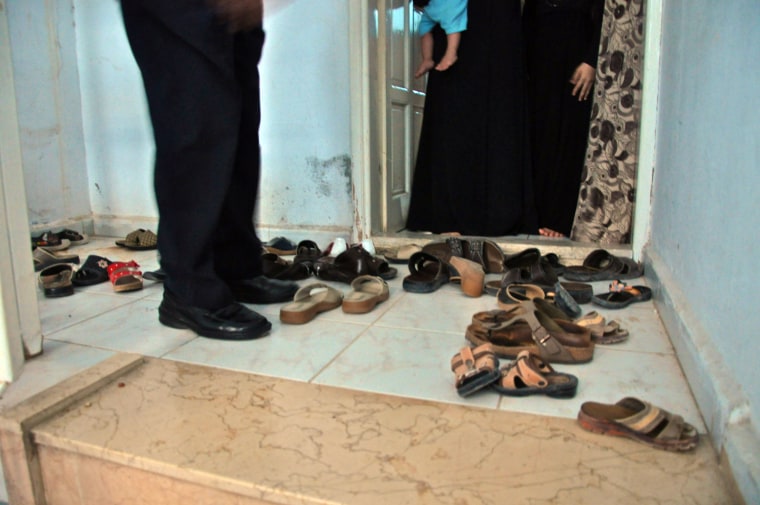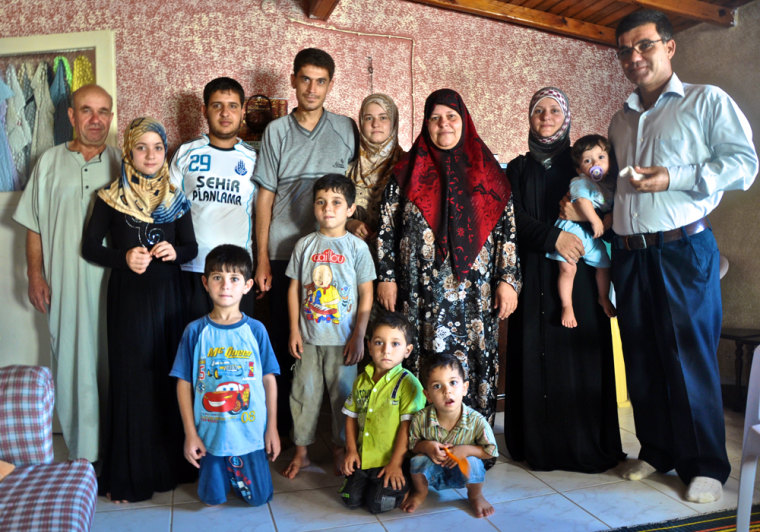ANTAKYA, Turkey – On the fourth floor of a rundown building, 20 pairs of shoes lay sprawled outside the apartment of Bassem Khattab, a 39-year-old Syrian refugee. One pair for each family member, he explains, and a few extra pairs shared among the children.
Khattab lives in the three-room apartment in this southern border town with a dozen relatives. Nine months ago, fearing for their safety amid Syria's brutal civil war, the family fled their hometown of Hama, Syria, and arrived here in a large cargo truck packed with 50 other people.

Turkish Prime Minister Recep Tayyip Erdogan's open-door policy for refugees has encouraged 450,000 Syrians to flee to Turkey since the war began in 2011. So far, more than 2 million Syrians have fled to neighboring countries, with many more expected to follow.
After seeking shelter from intense government shelling in a Hama basement with five other families for “10 freezing days” in December, Khattab said he knew they had to leave Syria. “You don’t know if there’s a tomorrow in Syria anymore,” said the father of three, who has lost several relatives and friends in the fighting.
Upon arriving in Turkey, the family decided against officially registering as refugees with the United Nations High Commissioner for Refugees (UNHCR) because they wanted to avoid overcrowded camps as well as the overburdened refugee bureaucracy, Khattab said. Khattab found the family the apartment in Antakya for the equivalent of $200 a month – paid for with the life savings they carried from Syria in cash.
Sitting in his new living room, sparsely decorated with a barely functional TV and two checkered sofas gifted from a Turkish charity, Khattab recalled his first glimpse of “the beast” of the Syrian regime, decades ago when he was a child.
In 1982, then President Hafez Assad, father of the current embattled President Bashar Assad, razed the city of Hama to crush a Sunni uprising. Though Sunni Muslims make up a majority of Syria’s population, the minority Alawite sect has run the country for more than four decades. Much of Hama’s old city was reduced to rubble during the attack, its people terrorized. While estimates vary, around 20,000 were said to have been slaughtered in the bloody episode.
“I remember they were shooting relatives, shooting people I knew,” Khattab said. “My parents wouldn’t let me go outside to play for days.”
Jeehad Khattab, Bassem’s father-in-law, listened as his son-in-law recounted these traumatic childhood memories. Jeehad recounted being overwhelmed with pride when he saw Hama’s next generation spilling into the streets when the uprising began in March 2011, chanting for Assad’s overthrow.
“This generation isn’t the same,” he said, tears filling his eyes, “That’s why I have hope. They silenced us for more than 30 years. But finally, we spoke out again. You can’t stop the tidal wave.”
His daughter, Mouneira, 27, sits hunched in the corner of the living room, nodding in agreement but sullen and silent. The family says she used to be more vibrant, talkative and light-hearted. But she hasn’t been the same since the day three months ago when she was feeding one of her young sons and received a call informing her that her husband, a fighter in the Free Syrian Army, had been killed by government shelling in the northern Syrian city of Aleppo.
“Bashar says the opposition are terrorists,” she explained while her three boys fought for space on her lap. “But look at us. Are we terrorists? We’re people who want freedom.”
The family has come to face a common reality for refugees: Life is in many ways harder here than it ever was in Syria. Bassem’s parents initially made the move with them to Turkey, but soon returned to Hama. “They said they’d rather die in Syria than live here,” he said. “I can’t blame them.”
Bassem, the main provider for the family of 13, says he tries to find odd jobs around Antakya. Technically, he is barred from working in Turkey since he lacks an employment visa, but he’s found some work teaching Arabic and English. A formerly well-paid English teacher in Syria, Bassem says he never thought he’d be banging on the door of restaurants begging for work. He usually makes around the equivalent of $300 a month, with two-thirds going toward rent.
“We’ve been making a lot of spaghetti here,” his wife Rasha says, blushing in embarrassment, in the family’s small kitchen. “We don’t cook the meals we used to back home.”
Rasha’s mother, Umm Mouneir, says she passes the time by pretending she’s still in Syria. But having left her house behind, including some of her favorite dishes given to her as wedding gifts decades ago, pretend only takes her so far.
“We have faith,” she said. “Once Bashar is gone, it will go back to normal.”
After a heavy silence, she smiled and got out her small maroon cellphone to play choppy, pixelated video from the wedding of her 17-year-old daughter Nour. The ceremony was held in the apartment three months ago.
Nour blushed at footage of herself dancing around the living room in a poofy white dress, lost in a couple hours of celebration. She hopes to one day become a nurse back in her hometown.
Khattab’s 11-year-old daughter Batul soon walked into the room with a tray of tea, moving with an intensity far beyond her age. She will start school next week, in one of six apartments Syrian refugees have rented as de-facto classrooms for Syrian children living in Antakya. Older refugees teach the classes.
“Weddings, school … life goes on here, not the same way, but it goes on,” Khattab smiles, taking a sip of tea. “We’re waiting, but we don’t stop living.”
Related story
Syrian refugees flood Turkish border towns, straining resources and tempers
